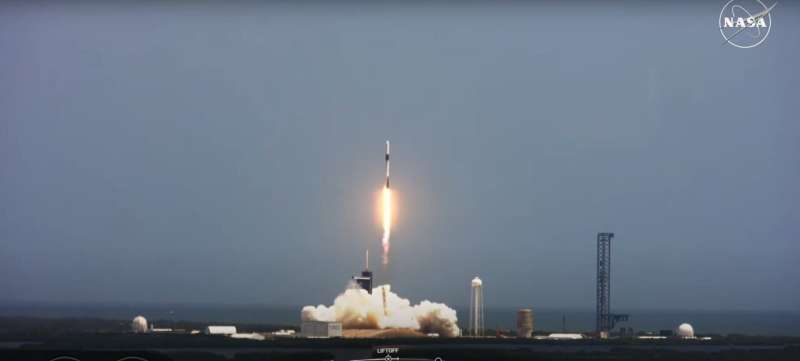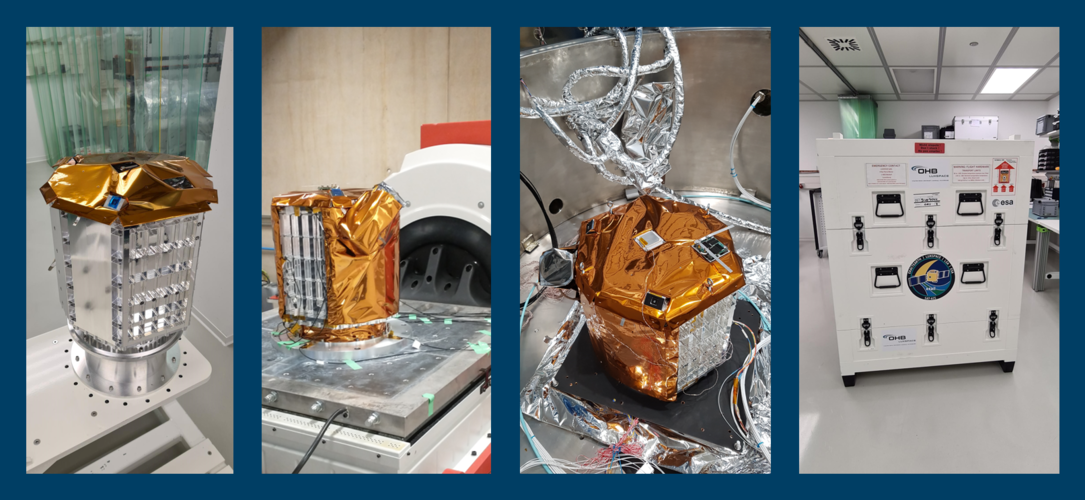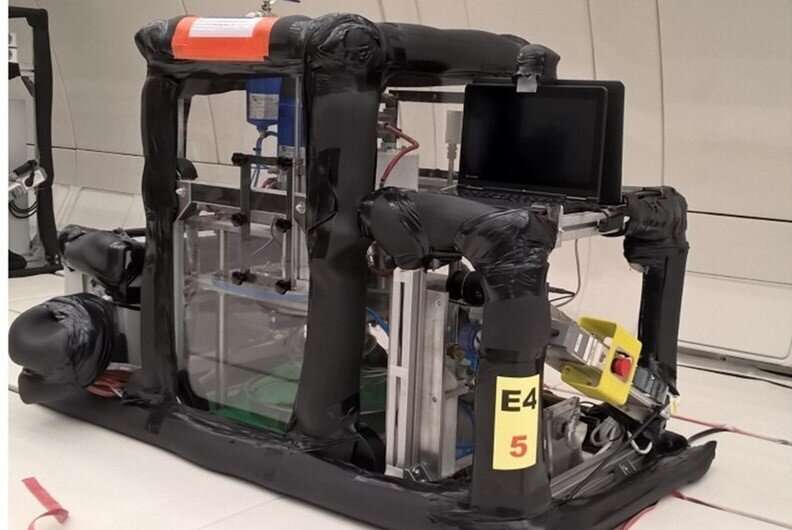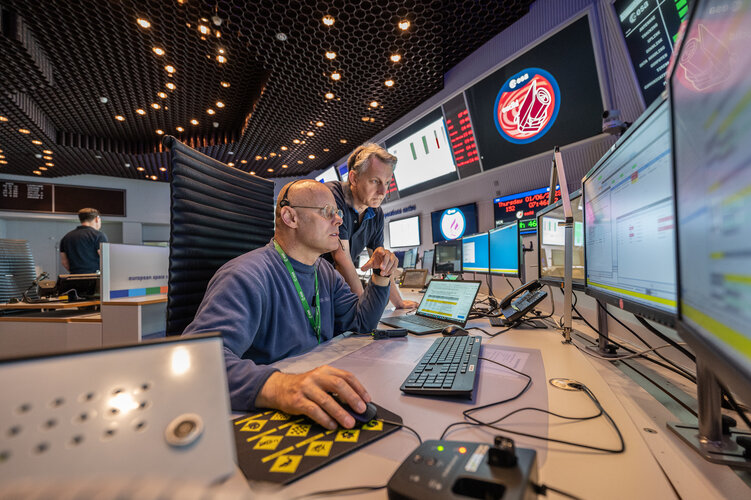NASA, SpaceX launch solar arrays, cargo to space station
Monday, 05 June 2023 16:37
Following a successful launch of NASA's SpaceX 28th commercial resupply services mission, two new solar arrays, science investigations, and supplies are on their way to the International Space Station.
Carrying more than 7,000 pounds of cargo to the orbiting laboratory, the uncrewed SpaceX Dragon spacecraft launched on the company's Falcon 9 rocket at 11:47 a.m. EDT, Monday, June 5, from NASA's Kennedy Space Center in Florida.
The cargo spacecraft is scheduled to autonomously dock with the space-facing port on the station's Harmony module at approximately 5:50 a.m. and remain at the station for about 21 days.
Falcon 9 launches cargo Dragon to space station with new solar arrays
Monday, 05 June 2023 16:30
A Falcon 9 launched a cargo Dragon spacecraft to the International Space Station on a mission emphasizing station hardware and supplies over science.
Viasat forms satcoms titan to take on a market in transformation
Monday, 05 June 2023 16:23
Viasat’s $6.2 billion Inmarsat acquisition has created a satellite communications behemoth with revenues that would rival other geostationary operators even after their potential consolidation deals.
Successful Launch and Deployment of Dragon into Orbit by SpaceX
Monday, 05 June 2023 15:18 After some delays over the weekend, SpaceX has successfully launched its Crew Resupply Mission 28 from the Kennedy Space Center in Florida. The initial launch was postponed due to unfavorable weather conditions, particularly high winds in the booster recovery zone.
The mission was successfully executed at 11:47 a.m. EDT Monday, with weather conditions deemed 60% favorable for liftoff. Spac
After some delays over the weekend, SpaceX has successfully launched its Crew Resupply Mission 28 from the Kennedy Space Center in Florida. The initial launch was postponed due to unfavorable weather conditions, particularly high winds in the booster recovery zone.
The mission was successfully executed at 11:47 a.m. EDT Monday, with weather conditions deemed 60% favorable for liftoff. Spac Nicolas Bobrinsky on innovation and risk management | ESA Masterclass
Monday, 05 June 2023 13:00 Video:
00:12:38
Video:
00:12:38
Innovation is triggered by many drivers. One of these is the constant need for ESA to develop innovative solutions, such as unique spacecraft technologies.
In this first video, Nicolas recalls how he and his team had to think outside the box to find a solution for ESA to communicate with Ulysses. The spacecraft was flying around the north pole of the Sun, which is much farther in deep space than satellites had been launched up to that point.
The success of this solution motivated the decision to build ESA’s first deep-space communications antennas in New Norcia, in Australia, thus enabling many ESA scientific firsts in deep-space exploration.
The antennas would, some decades after,
Connecting the Dots | Diversifying into in-orbit servicing
Monday, 05 June 2023 12:10
A growing in-orbit servicing opportunity is tempting satellite builders to branch out of communications, imagery, and other standard fare to get a foothold in this emerging market.
First Triton-X satellite starts journey for inaugural flight
Monday, 05 June 2023 10:11
The first satellite developed under the Triton-X multi-mission platform programme for low Earth orbit is on its way to be integrated onto the launcher for its inaugural flight.
Congress asks GAO for review of GeoXO weather satellite program
Monday, 05 June 2023 09:10
The top Republican members of two oversight committees have asked the Government Accountability Office (GAO) to review a major new weather satellite program.
Exploration of space industry best practice
Monday, 05 June 2023 07:30
ESA is reaching out to members of the industrial space sector, particularly small and medium-sized enterprises (SMEs), to take part in a survey on lessons learned in the space industry.
SpaceX is keeping up cadence with Starlink Group 6-4 mission
Sunday, 04 June 2023 13:34 At 8:20 a.m. EDT (1220 UTC) on Sunday, a Falcon 9 rocket launched 22 of SpaceX's brand-new "V2 Mini" internet satellites for its Starlink communications network from Space Launch Complex 40 (SLC-40) at the Cape Canaveral Space Force Station (CCSFS) in Florida.
The rocket went upright at 3:20 a.m. earlier this morning and was originally scheduled to launch before sunrise at 5:56 a.m. EDT (0
At 8:20 a.m. EDT (1220 UTC) on Sunday, a Falcon 9 rocket launched 22 of SpaceX's brand-new "V2 Mini" internet satellites for its Starlink communications network from Space Launch Complex 40 (SLC-40) at the Cape Canaveral Space Force Station (CCSFS) in Florida.
The rocket went upright at 3:20 a.m. earlier this morning and was originally scheduled to launch before sunrise at 5:56 a.m. EDT (0 Three Chinese astronauts return safely to Earth
Sunday, 04 June 2023 13:11
Three Chinese astronauts working at the country's space station have returned safely to Earth, state media reported Sunday, hailing the mission as a "complete success".
The return capsule of the Shenzhou-15 spaceship touched down at a landing site in northern China's Inner Mongolia region, according to state news agency Xinhua.
Astronauts Fei Junlong, Deng Qingming and Zhang Lu emerged from the capsule in "good physical condition", Xinhua reported.
"The mission... was a complete success," it said.
Footage showed medical officials in white jumpsuits and face masks swaddling the astronauts in blue blankets and carrying them away from the arid landing site, where the copper-colored capsule lay flanked by red flags.
The trio had spent six months at the Tiangong space station, conducting spacewalks and a variety of scientific experiments.
China last week sent three more astronauts—including its first civilian in orbit—to the space station as part of the successor Shenzhou-16 mission.
The world's second-largest economy has pumped billions of dollars into its military-run space program in an effort to catch up with the United States and Russia.
Kim's sister slams UN meeting on North Korea's spy satellite launch
Sunday, 04 June 2023 09:58 North Korean leader Kim Jong Un's powerful sister Kim Yo Jong slammed the UN Security Council for holding a "most unfair" meeting over Pyongyang's recent spy satellite launch, state media reported on Sunday.
North Korea's new Chollima-1 rocket lost thrust and crashed into the sea with its satellite payload on Wednesday, Pyongyang said in a rare same-day announcement, adding that another test
North Korean leader Kim Jong Un's powerful sister Kim Yo Jong slammed the UN Security Council for holding a "most unfair" meeting over Pyongyang's recent spy satellite launch, state media reported on Sunday.
North Korea's new Chollima-1 rocket lost thrust and crashed into the sea with its satellite payload on Wednesday, Pyongyang said in a rare same-day announcement, adding that another test Human extinction threat 'overblown' says AI sage Marcus
Sunday, 04 June 2023 09:58 Ever since the poem churning ChatGPT burst on the scene six months ago, expert Gary Marcus has voiced caution against artificial intelligence's ultra-fast development and adoption.
But against AI's apocalyptic doomsayers, the New York University emeritus professor told AFP in a recent interview that the technology's existential threats may currently be "overblown."
"I'm not personally th
Ever since the poem churning ChatGPT burst on the scene six months ago, expert Gary Marcus has voiced caution against artificial intelligence's ultra-fast development and adoption.
But against AI's apocalyptic doomsayers, the New York University emeritus professor told AFP in a recent interview that the technology's existential threats may currently be "overblown."
"I'm not personally th 

